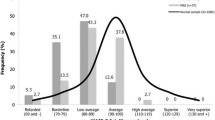Abstract
The intellectual performance of 22 children aged 3–16 years with maple syrup urine disease (MSUD) was assessed and compared to a group of early treated phenylketonuria (PKU) children and normal subjects matched by age, sex, nationality, and socio-economic status. All subjects were tested by one examiner only using the age related versions of the non-verbal Snijders-Oomen intelligence test. The mean IQ (±SD) score was 74±14 (range 50–103) in patients with MSUD, 101±12 (range 87–125) in early treated PKU patients, and 107±9 (range 90–122) in normal subjects. Intercorrelations indicated that length of time after birth that plasma leucine concentration remained >1 mmol/l and quality of long-term metabolic control have important influences on IQ.
Similar content being viewed by others
Abbreviations
- MSUD:
-
maple syrup urine disease
- PKU:
-
phenylketonuria
References
Berry GT, Heidenreich R, Kaplan P, Levine F, Mazur A, Palmieri MJ, Yudkoff M, Segal S (1991) Branched-chain amino acid-free parenteral nutrition in the treatment of acute metabolic decompensation in patients with maple syrup urine disease. N Engl J Med 324:175–179
Clow C, Reade TM, Scriver CR (1981) Outcome of early and long-term management of classical maple syrup urine disease. Pediatrics 68:858–862
Committee for Improvement of Hereditary Disease Management (1976) Management of maple syrup urine disease in Canada. Can Med Assoc J 115:1005–1013
Danner DJ, Elsas LJ (1989) Disorders of branched chain amino acid and keto acid metabolism. In: Scriver CR, Beaudet AL, Sly WS, Valle D (eds) The metabolic basis of inherited disease, 6th edn. McGraw-Hill, New York, pp 671–692
Kaplan P, Mazur A, Field M, Berlin JA, Berry GT, Heidenreich R, Yudkoff M, Segal S (1991) Intellectual outcome in children with maple syrup urine disease. J Pediatr 119:46–50
Kleining G, Moore H (1960) Das soziale Selbstbild der Gesellschaftsschichten in Deutschland. Kölner Z Soziol Sozialpsych 12
Langenbeck U, Wendel U, Mench-Hoinowski A, Kuschel D, Becker K, Przyrembel H, Bremer HJ (1978) Correlations between branched-chain amino acids and branched-chain α-keto acids in blood in maple syrup urine disease. Clin Chim Acta 88:283–291
Michel U, Schmidt E, Batzler U (1990) Results of psychological testing of patients aged 3–6 years. Eur J Pediatr 149 [Suppl 1]:34–38
Naughten ER, Jenkins J, Francis DEM, Leonard JV (1982) Outcome of maple syrup urine disease. Arch Dis Child 57: 918–921
Parini R, Sereni LP, Bagozzi DC, Rabier D, Narcy C, Saudubray JM (1991) Nasogastric continous feeding as the only treatment in neonatal maple syrup urine disease (abstract). 29th SSIEM Annual Symposium, Birmingham, p 128
Snijders-Oomen (1977) Nicht-verbale Intelligenztestreihe S.O.N. 2 1/2 bis 7 jahre. Wolters-Noordhoff, Groningen
Snyderman SE (1988) Treatment outcome of maple syrup urine disease. Acta Paediatr Jpn 30:417–424
Snyderman SE, Goldstein F, Sansaricq C, Norton PM (1984) The relationship between the branched chain amino acids and their ketoacids in maple syrup urine disease. Pediatr Res 18:851–853
Starren J (1978) S.S.O.N. 7 bis 17 Jahre. Die Entstehung einer neuen Version des S.O.N. für 7 bis 17jährige. Wolters-Noordhoff, Groningen
Van Doorninck WJ, Nord A, Green C (1989) Age of dietary initiation and outcome at middle childhood in maple syrup urine disease (abstract). Am J Hum Genet 45:37A
Wendel U (1984) Acute and long-term treatment of children with maple syrup urine disease. In: Adibi SA, Fekl W, Langenbeck U, Schauder P (eds) Branched-chain amino and keto acids in health and disease. Karger, Basel, pp 335–347
Wendel U (1990) Disorders of branched-chain amino acid metabolism. In: Fernades J, Saudubray JM, Tada K (eds) Inborn metabolic diseases. Diagnosis and treatment. Springer, Berlin Heidelberg New York, pp 263–270
Author information
Authors and Affiliations
Rights and permissions
About this article
Cite this article
Hilliges, C., Awiszus, D. & Wendel, U. Intellectual performance of children with maple syrup urine disease. Eur J Pediatr 152, 144–147 (1993). https://doi.org/10.1007/BF02072492
Received:
Accepted:
Issue Date:
DOI: https://doi.org/10.1007/BF02072492



